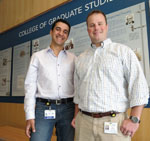|
by Dawn
Brazell
Public Relations
Most
oncologists would love to say they
found a way to combat metastatic
cancer – the most aggressive stage
of cancer.
Russ Jenkins,
M.D., Ph.D., just might get to do
it.
The
co-recipient of this year's
College of Graduate Studies
Distinguished Graduate of the Year
was drawn to MUSC's Medical
Scientist Training Program (MSTP),
in part, because of the stellar
reputation of Yusuf Hannun, M.D.,
former chair of MUSC's Department
of Biochemistry and Molecular
Biology.
 Drs.
Khaled Moussawi (left) and Russ
Jenkins, co-recipients of the
College of Graduate Studies
Distinguished Graduate of the Year
Award. Visit http://www.bit.ly/MUSCDistinguishedStudentsAward Drs.
Khaled Moussawi (left) and Russ
Jenkins, co-recipients of the
College of Graduate Studies
Distinguished Graduate of the Year
Award. Visit http://www.bit.ly/MUSCDistinguishedStudentsAward
Jenkins
graduated from the University of
Virginia with a bachelor's in
biology and decided to do a
post-baccalaureate research
fellowship at the National
Institutes of Health (NIH) in
2003. While there he heard a talk
by a former post-doctoral fellow
of Hannun's about sphingolipids
and inflammation.
"It was an area
I had absolutely no knowledge of –
none whatsoever, but it was very
fascinating to me. I figured it
was filling the gaps of a lot of
unknowns in a lot of different
areas, and I went to talk to him
afterwards about Dr. Hannun, MUSC
and the MSTP."
That
conversation was the beginning,
and after further research, Russ
applied to and interviewed at
MUSC. He was intrigued by the
research that Hannun and his
colleagues were doing and was
impressed with Perry Halushka,
Ph.D. M.D. dean of the College of
Graduate Studies and MSTP
director, and the stellar program
that he had built over the years.
"To get the NIH
MSTP designation is a big deal in
and of itself. Only the best
programs get that designation. I
quickly learned about MUSC's
tradition of excellence, both
clinically and scientifically.
Because of this strong background
and track record of turning out
really stellar M.D./Ph.D.s, I knew
that MUSC was the right place for
me."
He remembers
arriving for his interview in
November. "I got on the plane in
Washington where it was 40 degrees
and raining and I got off the
plane in Charleston, where it was
75 degrees and sunny. It was love
at first sight, and things went
better and better from there on."
During his
M.D./Ph.D training, Russ studied
sphingolipids and how they
specifically relate to
inflammation in cancer.
Sphingolipids are bioactive
molecules in the cell that
function as signal transducers –
serving in the cascade that
provides information about what's
happening outside the cell in
biochemical form. His project
centered on a particular enzyme,
acid sphingomyelinase (aSMase),
and how that enzyme – in response
to an inflammatory stimulus –
signals the cell to release other
potent inflammatory molecules,
known as chemokines. Chemokines
attract other inflammatory cells
to sites of inflammation, thus
adding fuel to the fire, and over
time can make cancer more
aggressive and ultimately drive
metastases.
"Chronic
inflammation is capable of driving
many forms of cancer, and it is
our hope that inhibitors of aSMase
will interrupt the cycle of
inflammation that is present in
these forms of cancer. If we are
successful, aSMase inhibitors may
someday serve as novel
therapeutics for the treatment of
cancer and other inflammatory
conditions."
When discussing
his research, Jenkins becomes
animated. His interest in medicine
started when he was younger. With
a father as a judge and a mother
as a nurse, pursuing a career in
law or medicine seemed logical.
With a string of outstanding high
school science teachers, Russ
decided to further explore his
interest in medical science.
During his undergraduate studies
at the University of Virginia,
everything locked in place, he
said. He worked for an M.D./Ph.D.
faculty member who specialized in
Parkinson's disease, and was able
to conduct research and also
shadow his physician-scientist
mentor in clinic once a week.
"It seemed like
a dream come true. I couldn't find
a better calling or a better job.
I knew it was the right thing for
me."
Jenkins, 32,
said it has been a long haul
getting through the eight-year
program. His wife, Courtney, has
been incredibly patient, kind and
understanding. Receiving his top
choice of residencies, Jenkins
will be heading to Boston for
internal medicine at the
Massachusetts General Hospital, a
Harvard affiliate hospital, in
late June, with hopes to stay in
Boston for his Hematology-Oncology
fellowship training. Khaled
Moussawi, M.D., Ph.D., the other
co-recipient of the Distinguished
Graduate of the Year, also will be
going there. They are thrilled to
be together a little longer. The
medical scientist training opens
many possible pathways for both of
them, he said.
"One of the
amazing things about having dual
degree training is that we can
create the kind of careers we want
that include clinical and research
work. I enjoy getting to care for
patients but also getting to
advance the care for those
patients."
One day Jenkins
hopes that someone with metastatic
cancer won't feel they've
necessarily been given a death
sentence.
"My goal is to
successfully treat or prevent
metastatic cancer, something that
currently lacks a successful
treatment option, where the
survival rate is less than 10
percent or 5 percent – to give
those people some hope. That's
where I'd like to direct my
efforts. If you can increase
someone's survival six months,
that's six months longer they have
with their family. But, that's
just the beginning. I'm hoping
that my research will set the
stage to turn six months into
years or longer."
|



 Drs.
Khaled Moussawi (left) and Russ
Jenkins, co-recipients of the
College of Graduate Studies
Distinguished Graduate of the Year
Award. Visit
Drs.
Khaled Moussawi (left) and Russ
Jenkins, co-recipients of the
College of Graduate Studies
Distinguished Graduate of the Year
Award. Visit